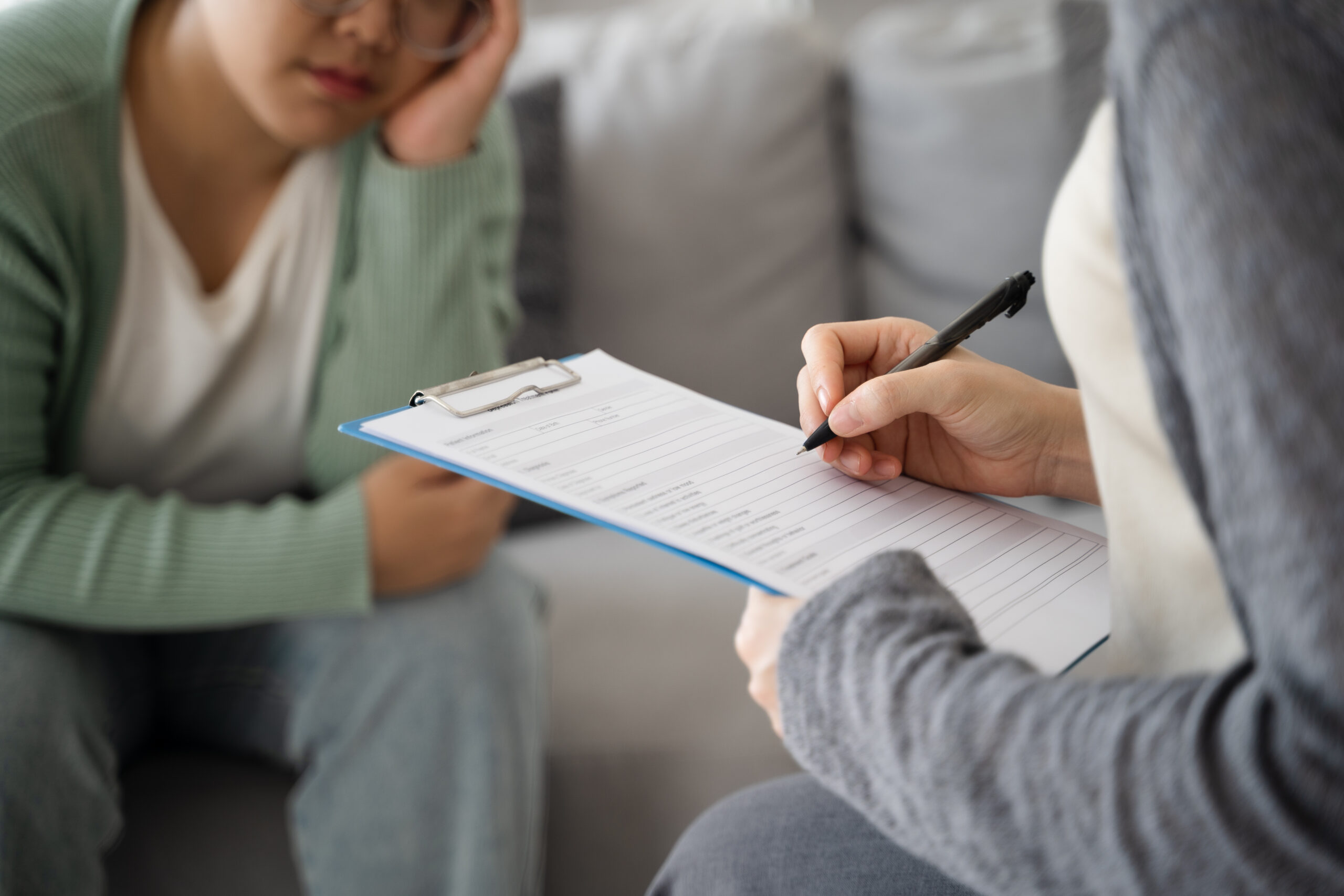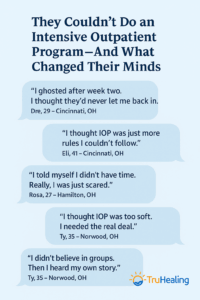They had every reason to walk away. Some of them did.
They were over it. Over the lectures, over the groups, over the idea that sitting in a room with strangers talking about feelings was supposed to fix anything. They ghosted, got high, worked overtime, lied to their families, or just plain vanished.
And yet—every single one of them found their way back to an Intensive Outpatient Program (IOP). Here’s what changed their minds.
1. “I ghosted after week two. I thought they’d never let me back in.”
Dre, 29 — Cincinnati, OH
“I walked out of group one day and never came back. Didn’t even answer their calls. I figured they’d write me off.”
Turns out, they didn’t. When Dre called back three weeks later—scared, ashamed, using again—he was met with one sentence that cracked him open: “You’re still welcome here.”
That was all it took. Not a lecture. Not a guilt trip. Just the open door.
He came back to TruHealing Cincinnati’s IOP and finished the full program. He said the second half was when it actually clicked. “The first few weeks, I was just physically there. The last few? I was actually present. And that made all the difference.”
Takeaway: If you’re afraid it’s “too late,” it probably isn’t. Programs like TruHealing Cincinnati know recovery isn’t a straight line.
2. “I thought IOP was just more rules I couldn’t follow.”
Kayla, 32 — Florence, KY
“Court told me to do IOP. I rolled my eyes. I was tired of people telling me what to do—probation, CPS, even my mom. I didn’t think I could stick to three days a week.”
Kayla was already feeling like a failure when she arrived. But what she didn’t expect was the way the staff at TruHealing treated her. “They didn’t treat me like a screw-up. They asked me what I needed. They let me be honest without freaking out.”
Her favorite moment? When she admitted she was struggling with transportation and instead of getting penalized, someone helped her coordinate rides.
Takeaway: Real recovery meets you where you are. And sometimes, the structure we fight the hardest is the one that saves us.
3. “I told myself I didn’t have time. Really, I was just scared.”
Eli, 41 — Cincinnati, OH
“I was working two jobs, trying to keep my marriage from falling apart, and white-knuckling it between beers. I thought IOP would wreck my schedule—or worse, expose how bad things were.”
It wasn’t until he missed his son’s birthday dinner—again—that Eli knew something had to give. “My wife said: ‘You’re not okay. Either get help, or we’re done.’ I knew she meant it.”
Eli called TruHealing the next day. The intake coordinator listened without judgment and explained that IOP could be scheduled around his evenings. “They made it work. That was the first time I didn’t feel like a burden to someone.”
Takeaway: You don’t have to quit your life to start changing it. IOP can fit around the mess—it doesn’t expect you to be perfect first.
4. “I thought IOP was too soft. I needed the real deal.”
Rosa, 27 — Hamilton, OH
“I’d been to detox. Inpatient. Even jail. IOP felt…less than. Like I wasn’t taking it seriously.”
Rosa assumed only inpatient treatment counted as “real recovery.” But after relapsing shortly after discharge, a mentor helped her see that maybe it wasn’t about how intense the program was. Maybe it was about what she needed right now.
IOP let her live at home, rebuild her relationships, and still have the safety net of group and support. “I was finally able to practice what I learned in real life—not just in a bubble.”
Takeaway: Hardcore isn’t always healing. Sometimes strength looks like staying, showing up, and not pretending you’ve got it all together.
5. “I didn’t believe in groups. Then I heard my own story.”
Ty, 35 — Norwood, OH
“I’m not a ‘group’ guy. I don’t share. I don’t cry in public. I figured IOP was just sitting in circles and pretending to care.”
Ty stayed quiet for the first two weeks. Then one night, another guy shared a story that mirrored his exactly. The hiding. The guilt. The drinking at lunch breaks.
“It hit me in the chest. I didn’t say anything right away. But I kept showing up. And eventually, I started talking too.”
Takeaway: You don’t have to spill your guts on day one. But when someone else speaks your truth out loud, it’s hard to stay numb.
Ready to Reconsider IOP? You’re Not Alone.
If you’re in or around Cincinnati and wondering if an Intensive Outpatient Program might actually help—you don’t have to decide today. But you do get to ask.
At TruHealing Cincinnati, we don’t shame you for leaving. We just want to help you come back.
📞 Call (513) 643-9117 to talk with someone who gets it. No pressure. Just possibilities.
Frequently Asked Questions About IOP
What is an Intensive Outpatient Program (IOP)?
An IOP is a structured treatment program that allows you to live at home while attending therapy sessions several times a week. It offers support for recovery without requiring full-time residential care.
Is IOP right for me if I’ve relapsed or ghosted before?
Yes. Many people leave and return to IOP. Programs like TruHealing Cincinnati are designed to welcome you back without judgment.
Can I work or take care of my family while in IOP?
Absolutely. IOP is built to be flexible. Many programs offer evening sessions to accommodate work and family life.
Do I have to talk in group therapy?
No one is forced to share. Many people start by just listening. When you’re ready, you’ll know.
How do I get started?
Call TruHealing Cincinnati at (513) 643-9117 or visit their Intensive Outpatient Program page to learn more and take the first step.


